- Home
- Roger Zelazny
Last Of The Wild Ones
Last Of The Wild Ones Read online
Last Of The Wild Ones
Roger Zelazny
Roger Zelazny
Last Of The Wild Ones
Spinning through the dream of time and dust they came, beneath a lake-cold, lake-blue, lake-deep sky, the sun a crashed and burning wreck above the western mountains; the wind a whipper of turning sand devils, chill turquoise wind out of the west, taking wind. They ran on bald tires, they listed on broken springs, their bodies creased, paint faded, windows cracked, exhaust tails black and gray and white, streaming behind them into the northern quarter whence they had been driven this day. And now the pursuing line of vehicles, fingers of fire curving, hooking, above, before them. And they came, stragglers and breakdowns being blasted from bloom to wilt, flash to smolder, ignored by their fleeing fellows ....
Murdock lay upon his belly atop the ridge, regarding the advancing herd through powerful field glasses. In the arroyo to his rear, the Angel of Death-all cream and chrome and bulletproof glass, sporting a laser cannon and two bands of armor-piercing rockets-stood like an exiled mirage glistening in the sun, vibrating, tugging against reality.
It was a country of hills, long ridges, deep canyons toward which they were being driven. Soon they would be faced with a choice. They could pass into the canyon below or enter the one farther to the east. They could also split and take both passages. The results would be the same. Other armed observers were mounted atop other ridges, waiting.
As he watched to see what the choice would be, Murdock's mind roamed back over the previous fifteen years, since the destruction of the Devil Car at the graveyard of the autos. He had, for twenty-five years, devoted his life to the pursuit of the wild ones. In that time he had become the world's foremost authority on the car herds-their habitats, their psychology, their means of maintenance and fueling-learning virtually everything concerning their ways, save for the precise nature of the initial flaw that one fatal year, which had led to the aberrant radio communicable program that spread like a virus among the computerized vehicles. Some, but not all, were susceptible to it, tightening the disease analogy by another twist of the wrench. And some recovered, to be found returned to the garage or parked before the house one morning, battered but back in service, reluctant to recite their doings of days past. For the wild ones killed and raided, turning service stations into fortresses, dealerships into armed camps. The black Caddy had even borne within it the remains of the driver it had monoed long ago.
Murdock could feel the vibrations beneath him. He lowered the glasses, no longer needing them, and stared through the blue wind. After a few moments more he could hear the sound, as well as feel it-over a thousand engines roaring, gears grinding, sounds of scraping and crashing-as the last wild herd rushed to its doom. For a quarter of a century he had sought this day, ever since his brother's death had set him upon the trail. How many cars had he used up? He could no longer remember. And now...
He recalled his days of tracking, stalking, observing, and recording. The patience, the self-control it had required, exercising restraint when what he most desired was the immediate destruction of his quarry. But there had been a benefit in the postponement-this day was the reward, in that it would see the passing of the last of them. Yet the things he remembered had left strange tracks upon the path he had traveled.
As he watched their advance, he recalled the fights for supremacy he had witnessed within the herds he had followed. Often the defeated car would withdraw after it was clear that it was beaten; grill smashed, trunk sprung, lights shattered, body crumpled and leaking. The new leader would then run in wide circles, horn blaring, signal of its victory, its mastery. The defeated one, denied repair from the herd supply, would sometimes trail after the pack, an outcast. Occasionally it would be taken back in if it located something worth raiding. More often, however, it wandered across the Plains, never to be seen mobile again. He had tracked one once, wondering whether it had made its way to some new graveyard of the autos. He was startled to see it suddenly appear atop a mesa, turn toward the face that rose above a deep gorge, grind its gears, rev its engine, and rush forward, to plunge over the edge, crashing, rolling, and burning below.
But he recalled one occasion when the winner would not settle for less than a total victory. The blue sedan had approached the beige one where it sat on a low hillock with four or five parked sports cars. Spinning its wheels, it blared its challenge at several hundred meters' distance, then turned, cutting through a half-circle, and began its approach. The beige began a series of similar maneuvers, wheeling and honking, circling as it answered the challenge. The sports cars hastily withdrew to the sidelines.
They circled each other as they drew nearer, the circle quickly growing smaller. Finally the beige struck, smashing into the blue vehicle's left front fender, both of them spinning and sliding, their engines racing. Then they were apart again, feinting-advancing a brief distance, braking, turning, backing, advancing.
The second engagement clipped off the blue vehicle's left rear taillight and tore loose its rear bumper. Yet it recovered rapidly, turned, and struck the beige broadside, partly caving it in. Immediately it backed off and struck again before the other had completely recovered. The beige tore loose, and spun away in reverse. It knew all the tricks, but the other kept rushing in, coming faster now, striking and withdrawing. Loud rattling noises were coming from the beige, but it continued its circling, its feinting, the sunlight through the risen dust giving it a burnished look, as of very old gold. Its next rush creased the right side of the blue vehicle. It sounded its horn as it pursued it and commenced an outward turn.
The blue car was already moving in that direction, however, gravel spewing from beneath its rear wheels, horn. blasting steadily. It leaped forward and again struck the beige upon the same side. As it backed off, the beige turned to flee, its horn suddenly silent.
The blue car hesitated only a moment, then sped after it, crashing into its rear end. The beige pulled away, leaking oil, doors rattling. But the blue car pursued it and struck again. It moved on, but the blue swerved, ran through a small arc, and hit it yet again upon the same side it had earlier. This time the beige was halted by the, blow, steam emerging from beneath its hood; this time, as the blue car drew back, it was unable to flee. Rushing forward, the blue struck it once more upon the badly damaged left side. The impact lifted it from the ground, turning it over onto the slope falling away sharply to its right. It rolled sideways, tumbling and bouncing, to be brought up with a crash upon its side. Moments later its fuel tank exploded.
The blue car had halted, facing downhill. It ran up an antenna from which half a dozen spinning sensors unfurled, a fairy totem pole shimmering in the fume-filled air. After a time it retracted the sensors and withdrew the aerial. It gave one loud blare of the horn then and moved away to round up the sports cars.
Murdock remembered. He put his glasses in their case as the herd neared the turning point. He could distinguish individual members now, unassisted. They were a sorrylooking lot. Seeing them, he recalled the points of the best that he had come across over the years. When their supplies of parts had been larger, they had used their external manipulators to modify themselves into some magnificent and lethal forms. Kilo for kilo, the wild ones had become superior to anything turned out in the normal course of production.
All of the car scouts, of course, went armed, and in the early days a number of them had experimented. Coming upon a small herd, they would cut out a number of the better ones, blasting the rest. Disconnecting the think boxes, they would have their partners drive them back. But attempts at rehabilitation had been something less than successful. Even a complete wipe, followed by reprogramming, did not render the susceptible individuals immune to relaps
e. Murdock even recalled one that had behaved normally for almost a year, until one day in the midst of a traffic jam it had monoed its driver and taken off for the hills. The only alternative was to discard the entire computational unit and replace it with a new one which was hardly worthwhile, since its value was far greater than that of the rest of the vehicle.
No, there had been no answer in that direction. Or any other but the course that he had followed; track and attack, the systematic destruction of the herds. Over the years his respect for the cunning and daring of the herd leaders had grown. As the wild ones had dwindled in number, their ferocity and guile had reached the level of legend. There had been nights, as he lay sleeping, that he dreamed of himself as a wild car, armed, racing across the Plains, leader of a herd. Then there was only one other car, a red one.
The herd began its turn. Murdock saw, with a sudden pang of regret, that it was heading into the far eastern canyon. He tugged at his white-streaked beard and cursed as he reached for his stick and began to rise. True, there would still be plenty of time to get over to the next canyon for the kill, but- No! Some of them were splitting off, heading this way!
Smiling, he drew himself upright and limped rapidly down the hill to where the Angel of Death waited for him. He heard the exploding mines as he climbed into the vehicle. It's motor began to hum.
"There are a few in the next canyon," came the soft, well-modulated, masculine voice of his machine. "I have been monitoring all bands."
"I know," he answered, stowing his stick. "Let's head over that way. Some will make it through."
Safety restraints snapped into place around him as they began to move.
"Wait!"
The white vehicle halted.
"What is it that you wish?"
"You are heading north."
"We must, to exit here and enter the next canyon with the others."
"There are some connecting side canyons to the south. Go that way. I want to beat the others in."
"There will be some risk involved."
Murdock laughed.
"I've lived with risk for a quarter of a century, waiting for this day. I want to be there first for the end. Go south!"
The car swung through a turn and headed southward.
As they cruised along the arroyo bottom's sand, Murdock asked, "Hear anything?"
"Yes," came the reply. "The sounds of those who were blasted by the mines, the cries of those who made it through."
"I knew some would make it! How many? What are they doing now?
"They continue their flight southward. Perhaps several dozen. Perhaps many more. It is difficult to estimate from the transmissions."
Murdock chuckled.
"They've no way out. They'll have to turn sooner or later, and we'll be waiting."
"I am not certain that I could deal with a mass attack by that many-even if most lack special armaments."
"I know what I'm doing," Murdock said. "I've chosen the battleground."
He listened to the muffled thuds of the distant explosions.
"Prime the weapons systems," he announced. "Some of them could have located the sideway we'll be taking."
A twin band of yellow lights winked out on the dashboard and were replaced by a double row of green ones. Almost immediately these faded and were succeeded by two lines of steady, red points.
"Ready on rockets," came the voice of the Angel.
Murdock reached out and threw a switch.
A larger light had also come on-orange and pulsing faintly.
"Cannon ready."
Murdock threw a larger switch beside a pistol grip set in the dash below it.
"I'll keep this one on manual for now."
"Is that wise?"
Murdock did not answer. For a moment he watched the bands of red and yellow strata to his left, a veil of shadow being drawn slowly upward over them.
"Slow now. The sideway will be coming up shortly. It should be up there on the left."
His car began to slow.
"I believe that I detect it ahead."
"Not the next one. It's blind. There's one right after it, though. It goes through."
They continued to slow as they passed the mouth of the first opening to the left. It was dark and angled off sharply.
"I've become aware of the next one."
"Very slowly now. Blast anything that moves."
Murdock reached forward and took hold of the pistol grip.
Angel braked and made the turn, advancing into a narrow pass.
"Dim the ready lights. No transmissions of any sort. Keep it dark and quiet."
They moved through an alley of shadow, the distant explosions having become a pulsing more felt than heard now. Stony walls towered on either hand. Their way wound to the right and then to the left.
Another right-hand twisting, and there was a bit of brightness and a long line of sight.
"Stop about three meters before it opens out," Murdock said, not realizing until moments later that he had whispered.
They crept ahead and came to a halt.
"Keep the engine running."
"Yes."
Murdock leaned forward, peering into the larger canyon running at right angles to their own. Dust hung in the air-dark, murky below, sparkling higher above, where the sun's rays could still reach.
"They've already passed," he reflected "and soon they should realize they're in a box -a big one, but still a box. Then they'll turn and come back and we'll open up on them." Murdock looked to the left. "Good place right over there for some more of our people to lay up and wait for them. I'd better get in touch and let them know. Use a fresh scrambler this time."
"How do you know they'll be coming back? Perhaps they'll lay up in there and make you come in after them."
"No," Murdock said. "I know them too well. They'll run for it."
"Are you sure there aren't any other sideways?"
"None going west. There may be a few heading east, but if they take them, they'll wind up in the other trap. Either way, they lose."
"What if some of those others cut down this way?"
"The more, the merrier. Get me that line. And see what you can pick up on the herd while I'm talking."
Shortly after that, he was in touch with the commander of the southern wing of the pursuers, requesting a squad of armed and armored vehicles to be laid up at the point he designated. He learned that they were already on their way to the western canyon in search of those vehicles observed entering there. The commander relayed Murdock's message to them and told him that they would be along in a matter of minutes. Murdock could still feel the shock waves from the many explosions in the eastern canyon.
"Good," he said, and he ended the transmission.
"They've reached the end," the Angel announced a little later, "and are circling. I hear their broadcasts. They are beginning to suspect that there is no way out."
Murdock smiled. He was looking to his left, where the first of the pursuing vehicles had just come into sight. He raised the microphone and began giving directions.
As he waited, he realized that at no time had he relaxed his hold on the pistol grip. He withdrew his hand, wiped his palm on his trousers, and returned it.
"They are coming now," the Angel said. "They have turned and are headed back this way."
Murdock turned his head to the right and waited. The destruction had been going on for nearly a month, and today's should be the last of it. He suddenly realized just how tired he was. A feeling of depression began to come over him. He stared at the small red lights and the larger, pulsing orange one.
"You will be able to see them in a moment."
"Can you tell how many there are?"
"Thirty-two. No, hold it ... thirty-one. They are picking up speed. Their conversations indicate that they anticipate an interception."
"Did any come through from the eastern canyon?"
"Yes. There were several."
The sound of their engines came to
him. Hidden there in the neck of the ravine, he saw the first of them -a dark sedan, dented and swaying, half of its roof and the nearest fender torn away-come around the canyon's bend. He held his fire as it approached, and soon the others followed-rattling, steaming, leaking, covered with dents and rust spots, windows broken, hoods missing, doors loose. A strange feeling came into his breast as he thought about the more magnificent specimens of the great herds he had followed over the years.
Still, he held his fire, even as the first in line drew abreast of him, and his thoughts went back to the black and shining Devil Car and to Jenny, the Scarlet Lady, with whom he had hunted it.
The first of the pack reached the place where the ambushers waited.
"Now?" the Angel asked, just as the first rocket flared off to the left.
" "
Yes.
They opened up and the destruction began, cars braking and swerving into one another, the canyon suddenly illuminated by half a dozen blazing wrecks-a dozen-two.
One after another, they were halted, burned. Three of the ambushers were destroyed by direct crashes. Murdock used all of his rockets and played the laser over the heaped remains. As the last wreck burst into flame, he knew that, though they weren't much compared with the great ones he had known, he would never forget how they had made their final run on bald tires, broken springs, leaking transmissions, and hate.
Suddenly he swiveled the laser and fired it back along the canyon.
"What is it?" the Angel asked him.
"There's another one back there. Don't you pick it up?"
"I'm checking now, but I don't detect anything."
"Go that way."
They moved forward and turned to the right. Immediately the radio crackled.
"Murdock, where are you going?" This came from one of the ambushers to the rear.
"I thought I saw something. I'm going ahead to check it out."
"I can't give you an escort till we clear some of these wrecks."
"That's all right."
"How many rockets have you got?"
He glanced again at the dash, where the only light that burned was orange and pulsing steadily.

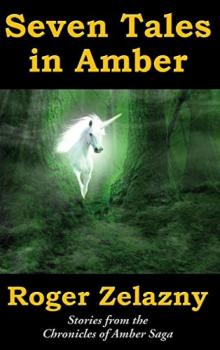 Seven Tales in Amber
Seven Tales in Amber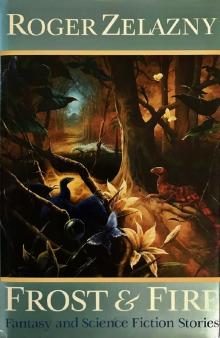 Frost and Fire
Frost and Fire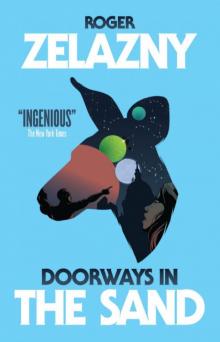 Doorways in the Sand
Doorways in the Sand Unicorn Variation
Unicorn Variation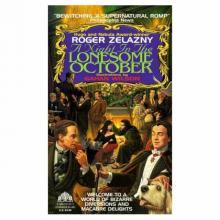 A Night in the Lonesome October
A Night in the Lonesome October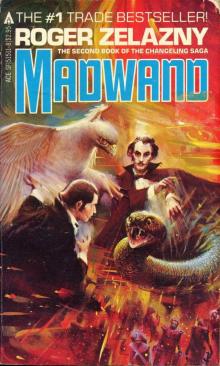 Madwand
Madwand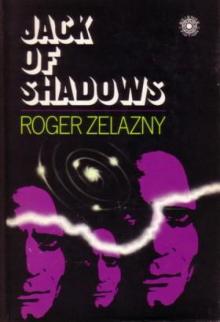 Jack Of Shadows
Jack Of Shadows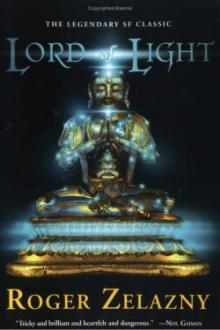 Lord of Light
Lord of Light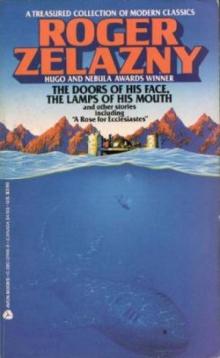 The Doors of His Face, The Lamps of His Mouth and Other Stories
The Doors of His Face, The Lamps of His Mouth and Other Stories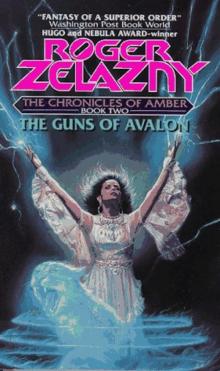 Guns Of Avalon tcoa-2
Guns Of Avalon tcoa-2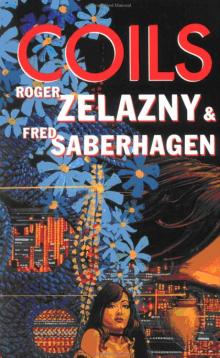 Coils
Coils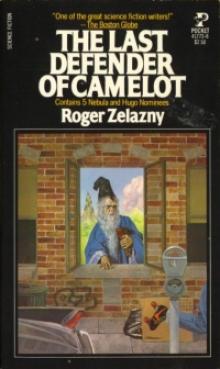 The Last Defender Of Camelot
The Last Defender Of Camelot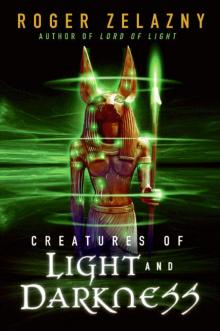 Creatures of Light and Darkness
Creatures of Light and Darkness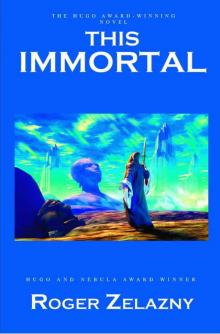 This Immortal
This Immortal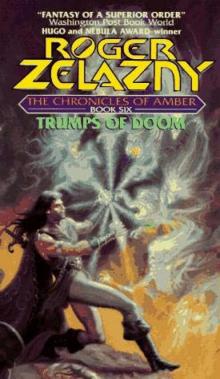 Trumps of doom tcoa-6
Trumps of doom tcoa-6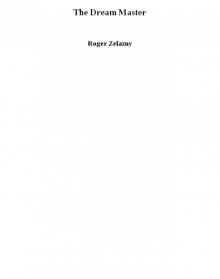 The Dream Master
The Dream Master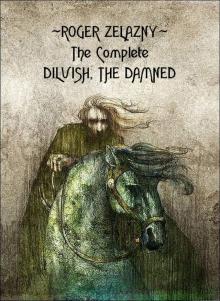 The Complete Dilvish, The Damned
The Complete Dilvish, The Damned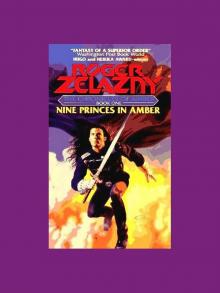 Nine Princes in Amber
Nine Princes in Amber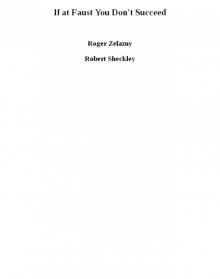 If at Faust You Don't Succeed
If at Faust You Don't Succeed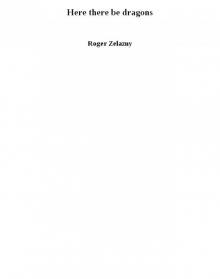 Here there be dragons
Here there be dragons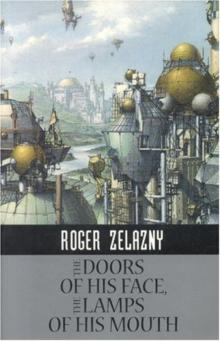 The Doors Of His Face, The Lamps Of His Mouth
The Doors Of His Face, The Lamps Of His Mouth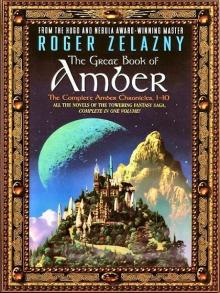 The Great Book of Amber - Chronicles 1-10
The Great Book of Amber - Chronicles 1-10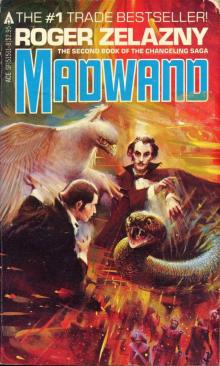 Madwand (Illustrated)
Madwand (Illustrated)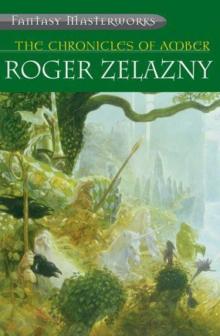 The Chronicles of Amber
The Chronicles of Amber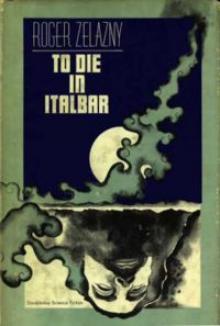 To Die In Italbar
To Die In Italbar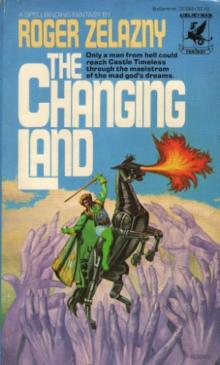 The Changing Land
The Changing Land The Furies
The Furies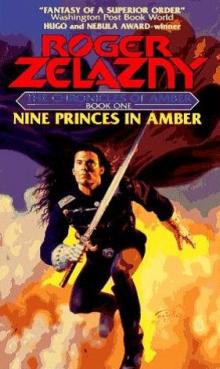 Nine Princes In Amber tcoa-1
Nine Princes In Amber tcoa-1 Last Of The Wild Ones
Last Of The Wild Ones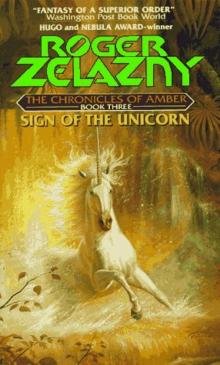 Sign of the Unicorn tcoa-3
Sign of the Unicorn tcoa-3 My Name is Legion
My Name is Legion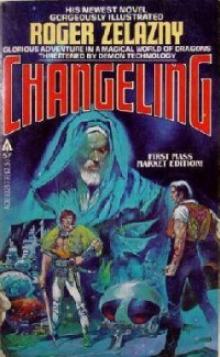 Wizard World 1: Changeling
Wizard World 1: Changeling Changeling
Changeling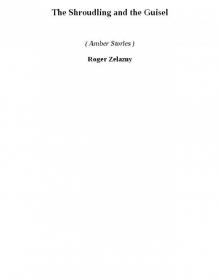 The Shroudling and the Guisel (amber stories)
The Shroudling and the Guisel (amber stories)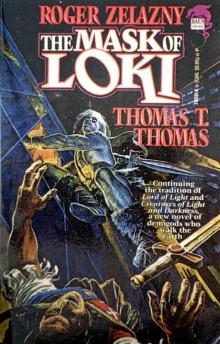 The Mask of Loki
The Mask of Loki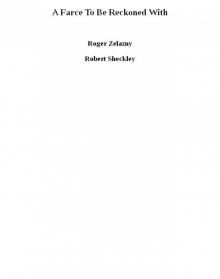 A Farce To Be Reckoned With
A Farce To Be Reckoned With Roadmarks
Roadmarks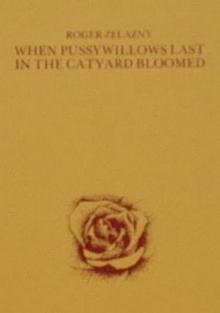 When Pussywillows Last in the Catyard Bloomed (rtf)
When Pussywillows Last in the Catyard Bloomed (rtf) Hall of Mirrors (amber stories)
Hall of Mirrors (amber stories) Permafrost
Permafrost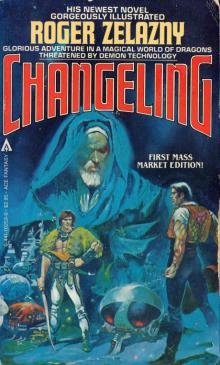 Changeling (Illustrated)
Changeling (Illustrated)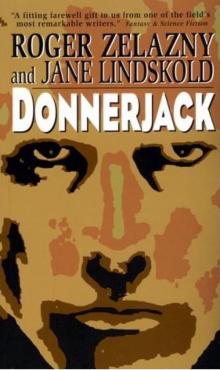 Donnerjack
Donnerjack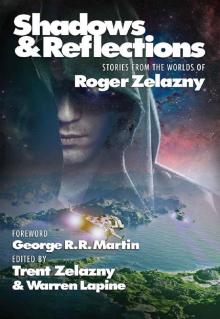 Shadows & Reflections: A Roger Zelazny Tribute Anthology
Shadows & Reflections: A Roger Zelazny Tribute Anthology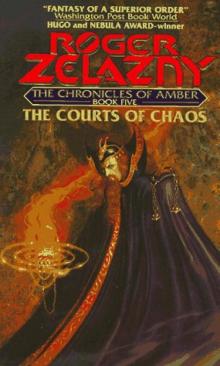 The Courts Of Chaos tcoa-5
The Courts Of Chaos tcoa-5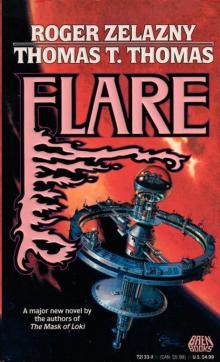 Flare
Flare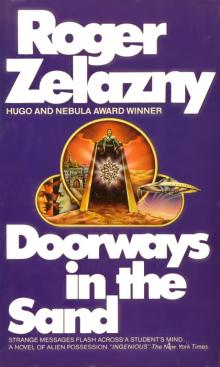 Doorsways in the Sand
Doorsways in the Sand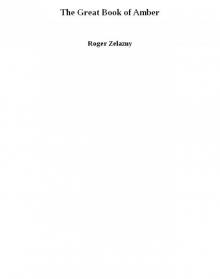 The Great Book of Amber
The Great Book of Amber Home Is the Hangman
Home Is the Hangman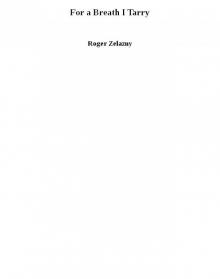 For a Breath I Tarry
For a Breath I Tarry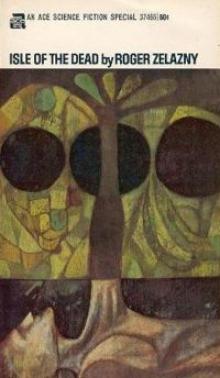 Isle Of The Dead
Isle Of The Dead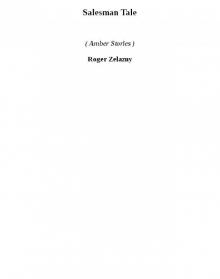 Salesman Tale (amber stories)
Salesman Tale (amber stories) Dismal Light
Dismal Light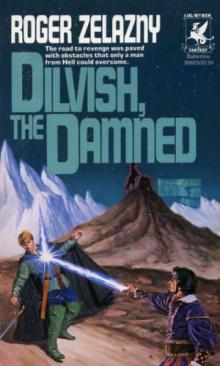 Dilvish, The Damned
Dilvish, The Damned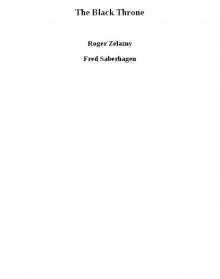 The Black Throne
The Black Throne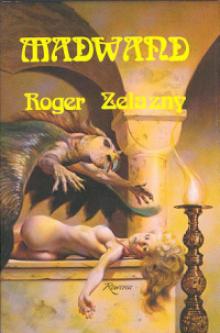 Wizard World 2: Madwand
Wizard World 2: Madwand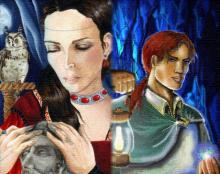 The Salesman's Tale
The Salesman's Tale